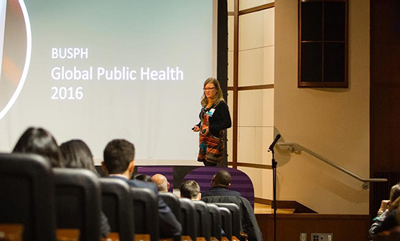Students Embrace Innovation at IDEA Conference.

A few inches of snow couldn’t stop ardent minds from transforming visionary ideas into tangible products or services that yield meaningful impact.
On Saturday, March 2, School of Public Health students Mackenzie Bullard and DL Lundberg, and alum Marion McNabb (SPH’16), lent their entrepreneurial expertise and passion for innovation to 315 students who braved the inclement weather to attend the second annual IDEA Conference. Drawing students from 19 universities to Questrom School of Business, the one-day event was organized by Innovate@BU, a university-wide initiative that provides resources for students and alumni to master innovation and entrepreneurial skills.
The creative energy was palpable as students engaged in a full day of activities and workshops designed to ignite their imagination and arm them with the tools needed to turn their ideas of technology, social impact, and arts and culture into reality. Bullard, Lundberg, and McNabb joined a lineup of expert innovators representing dozens of organizations and fields.
Bullard, a second-year Master of Public Health student studying health policy and law, serves as the SPH representative on the Innovate@BU Student Leadership Council and played an integral role in planning and facilitating the conference.
“One of the reasons I became involved with Innovate@BU was because, in a space that’s so involved with technology, it’s really important that we keep humanity, health, and human rights at the core of what we’re doing,” Bullard said. “There are a lot of inequities and suffering in the world, so I came here with the notion of how we can make ventures that relieve human suffering.”
 Bullard also co-moderated a panel session at the conference titled “Where Do Ideas Come From,” which featured a conversation with founders of startups in the health and science industries. McNabb, who founded the Cannabis Community Care and Research Network (C3RN), was a panelist, along with BU alum Rebecca Love, nurse and founder of healthcare mobile app Ryalto; Muhammad Hamid Zaman, professor of biomedical engineering and international health who leads the Zaman Laboratory; and Glenn Robertelli, cofounder and COO of Admetsys, a startup that developed an artificial pancreas for hospital and surgical settings.
Bullard also co-moderated a panel session at the conference titled “Where Do Ideas Come From,” which featured a conversation with founders of startups in the health and science industries. McNabb, who founded the Cannabis Community Care and Research Network (C3RN), was a panelist, along with BU alum Rebecca Love, nurse and founder of healthcare mobile app Ryalto; Muhammad Hamid Zaman, professor of biomedical engineering and international health who leads the Zaman Laboratory; and Glenn Robertelli, cofounder and COO of Admetsys, a startup that developed an artificial pancreas for hospital and surgical settings.
McNabb, who completed the SPH doctoral program in 2016 with a focus on global health, recounted her transition from designing sexual and reproductive health programs in Africa and Haiti to founding a virtual center of excellence for medical and adult use cannabis care and research. She says she felt compelled to delve into the cannabis industry to break the barriers of the medical use of marijuana. She entered and won an Innovate@BU cannabis startup competition in November 2017, and the $10,000 prize jumpstarted the social justice-focused virtual network of academics, healthcare providers, consumers, and patients.
“Since it is federally illegal, funding for research on cannabis has been limited—so it’s a huge challenge, but there is a real need for cannabis research and education,” says McNabb, adding that her center’s research and education efforts have been impactful on an individual patient level, industry level, and policy level. “Our pilot study survey of cannabis consumers and patients found that 63 percent are using cannabis to reduce unwanted prescription medications. That’s an alarming number.”
She told the audience that in order to be a successful entrepreneur, “You have to show up and not give up when people say no.”
Lundberg, a second-year MPH student, delivered a five-minute Ignite Talks presentation on their nonprofit social enterprise Make Fashion Clean (MFC), which tackles the public health issue of “denim dumping”—how discarded American clothing is often shipped to Africa and sent straight to landfills, creating pollution and a host of other environmental concerns. Employing Ghanaian artists, MFC upcycles second-hand American clothing and turns them into fashion products. Lundberg received initial resources for the project through the Summer Accelerator program at the BUild Lab, which is where Innovate@BU is also housed.
“As a public health person who often thinks about the negative impacts of consumption, I’m somewhat surprised to be standing here at an innovation and entrepreneurs conference talking about a fashion project,” Lundberg said. “But innovation is not just about trying to sell a bunch of products to every corner of the globe.
“It’s about bringing together a group of really different people who wouldn’t otherwise be connected, to create something new and useful that can change perspectives.”